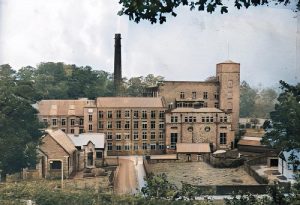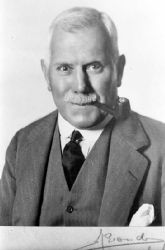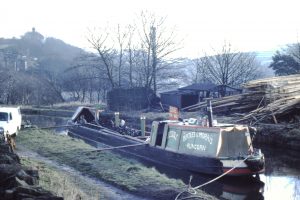In 1882 Edmund Lomas Oliver entered the firm of Thomas Oliver and Sons at the age of seventeen. He was the second son of Thomas Oliver, who owned the Waterhouse Mill, a steam and water-powered cotton mill. Sadly, the mill finally closed in 1960 and was demolished two years later, the site now being home to the new Co-op and housing estate on Wellington Road.
It was said that Oliver’s Mill spun the finest cotton thread in the world and during the First World War it was in great demand for making the material used on the wings of airplanes. Two of Edmund Lomas Oliver’s sons, Ian and Gordon, served in the war, Ian being wounded while fighting with the South Stafford Regiment, and Edmund himself made several journeys to the continent to ensure Oliver’s thread was up to the required strengths, so he would have had first-hand experience of the devastation of war.

It appears that the Oliver family had always shown concern for their workers. Before the American Civil War of 1861-1865, Thomas Oliver had the foresight to lay in stocks of cotton, ensuring his workforce still had jobs, whereas many other local people became unemployed, creating much distress in the village.

The aftermath of the war created similar hardships and Edmund would have been only too aware of the poverty endured by so many. To help alleviate this he founded the Oliver Sick Nursing Trust (now known as The Oliver Trust) in 1926, ‘for the benefit of the sick poor of Bollington’, using the income from £500 of War Stock and £500 of shares in the Manchester Ship Canal. Assistance was also given to service men and women who had returned from the war, together with regular donations to the British Legion.
The Trust must have been a godsend to many local folk during the Great Depression of the 1930’s, when industrial towns like Bollington were plunged into grinding poverty and unemployment ran at over 20%. This was a time before the wonders of our free NHS, where men and boys even resorted to diving into the canal in search of coal fallen off the barges, in a desperate attempt to keep their families warm.
It is recorded that in 1963 the Trust could give non-recurring grants to residents of Bollington to:
- Supply bedding, comforts, food, fuel or medicine.
- Help with the expense of recuperative holidays or of obtaining domestic help.
- Donate towards costs for staying in a convalescent home.

In present times the philosophy of aiming to improve physical or mental well-being through practical means remains the same. Over the last few years grants have been given towards the purchase of a variety of items such as a washing machine, a vacuum cleaner, school clothing and a reclining chair for a person with mobility issues. Help has also been given towards gas and electricity bills and the purchase of food vouchers during crisis situations, house repairs, and short-term taxi costs for an isolated person to attend weekly reminiscence sessions at the Bridgend Centre. One recurring request has been for funding toward the installation of stair-lifts to enable individuals to stay in the security of their own homes as their health deteriorates.
If you feel that you, or anybody you know who lives in Bollington, is experiencing difficulties with their physical or mental health and could benefit from a grant, please contact Sandra, Secretary of The Oliver Trust, on 01625 571126.
© Ann Mayer 2024
Acknowledgement
Our grateful thanks go to Ann Mayer who researched the Oliver Trust and prepared this article, which was first published in the Bridgend Newsletter, No.105, 12th January 2024.
The picture of Waterhouse mill – Oliver’s mill – is a monochrome picture beautifully colourized by Arthur Lashford.